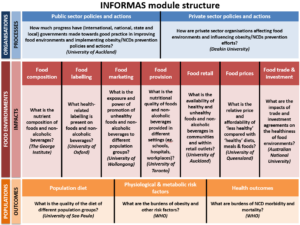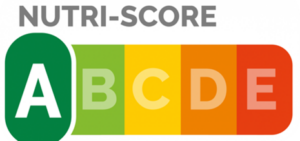PAHO/WHO Sodium Reduction
Analysis of Sodium and Trans Fat in 4 Latin American Countries
In 2022, the L’Abbe Lab was contracted by PAHO to provide support for data collection and analysis of sodium and Trans Fatty Acid (TFA) contents in processed and ultraprocessed food products in Argentina, Costa Rica, Panama and Peru. We also provided a Regional update of the sodium content in packaged foods with respect to Regional and Global sodium reduction targets.
This study provided critical evidence to support the adoption and implementation of the Updated Regional Sodium Reduction Targets, WHO global sodium benchmarks, and the WHO REPLACE technical package for iTFA elimination.
UofT’s FINAL REGIONAL AND TECHNICAL REPORTS, Submitted to PAHO Dec 5, 2022
Technical Advisory Group
 In 2009, PAHO launched the initiative “Cardiovascular Disease Prevention through Population-wide Dietary Salt Reduction” with the broader goal of reducing population dietary sodium intake in Member States and meeting the WHO 2025 global target of a 30% relative reduction in mean population sodium intake. Dr. Mary L’Abbe has been part of the Technical Advisory group accompanying this Regional initiative and chaired its phase 3.
In 2009, PAHO launched the initiative “Cardiovascular Disease Prevention through Population-wide Dietary Salt Reduction” with the broader goal of reducing population dietary sodium intake in Member States and meeting the WHO 2025 global target of a 30% relative reduction in mean population sodium intake. Dr. Mary L’Abbe has been part of the Technical Advisory group accompanying this Regional initiative and chaired its phase 3.
- Click here for the first sodium TAG meeting, 2016-2019
- Click here for technical documents on sodium reduction
PAHO Regional Sodium Reduction Targets
As part of Phase 3 of the PAHO initiative to reduce population sodium intake, a decision was made to expand and update the PAHO regional sodium reduction targets to lower the current target values, for which many foods are now meeting, and increase the number of food categories with targets, where warranted.
The L’Abbe Lab, as the WHO Collaborating Centre on Nutrition Policy for Chronic Disease Prevention, has collaborated with the Pan American Health Organization (PAHO/WHO) on updating Regional Sodium Reduction Targets.
International Development Research Centre Projects
Scaling Up and Evaluating Salt Reduction Policies and Programs in Latin American Countries
Completed in 2020, this project addressed Latin America’s high blood pressure rates through research that aimed to strengthen and expand existing sodium reduction programs. The project also aimed to introduce new programs in Argentina, Brazil, Costa Rica, Paraguay, and Peru.
Click HERE for links to all publications, including journal articles, technical reports, user guides and policy briefs.
Implementation of a Population-wide Program to Reduce Salt and Sodium Consumption in Costa Rica
 Completed in 2020, this project aimed to produce evidence and tools to support policies and interventions to reduce sodium intake in Costa Rica. Our research team provided scientific evidence to identify the main dietary sources of sodium in the Costa Rican diet. We also reported on students’ knowledge, perceptions, and behaviours related to sodium, food labeling, and health. The evidence served as an evaluation baseline for the National Plan for Salt Intake Reduction in Costa Rica. Other countries in the region will benefit from Costa Rica’s initiative and experience.
Completed in 2020, this project aimed to produce evidence and tools to support policies and interventions to reduce sodium intake in Costa Rica. Our research team provided scientific evidence to identify the main dietary sources of sodium in the Costa Rican diet. We also reported on students’ knowledge, perceptions, and behaviours related to sodium, food labeling, and health. The evidence served as an evaluation baseline for the National Plan for Salt Intake Reduction in Costa Rica. Other countries in the region will benefit from Costa Rica’s initiative and experience.
INFORMAS
The International Network for Food and Obesity/non-communicable diseases (NCD) Research, Monitoring and Action Support (INFORMAS) is a global network of public-interest organizations and researchers that aims to monitor, benchmark and support public and private sector actions to create healthy food environments and reduce obesity, NCDs and their related inequalities. The INFORMAS framework includes two ‘process’ modules, that monitor the policies and actions of the public and private sectors, seven ‘impact’ modules that monitor the key characteristics of food environments and three ‘outcome’ modules that monitor dietary quality, risk factors and NCD morbidity and mortality. Monitoring frameworks and indicators have been developed for 10 modules to provide consistency, but allowing for stepwise approaches (‘minimal’, ‘expanded’, ‘optimal’) to data collection and analysis.
For a full list of INFORMAS publications in Obesity Reviews and others co-authored by Dr. L’Abbe, click HERE.
The L’Abbé Lab are currently conducting research in 5 of these domains in Canada, including: (1) public sector policies and actions, (2) private sector policies and actions, (3) food labelling and health claims, (4) food composition, and (5) food prices. Food retail and food promotion modules are also being completed in collaboration with Canadian research groups.
Additionally, Dr. L’Abbe and the INFORMAS team have worked on a project that addresses the increase in obesity and nutrition-related non-communicable diseases (NR-NCDs) in Ghana. Code-named the Measurement, Evaluation, Accountability, and Leadership Support for NCDs (MEALS4NCDs) project, it aims to measure and support public sector actions that create healthy food marketing, retail, and provisioning environments for Ghanaian children using adapted methods from INFORMAS.
For more information, visit INFORMAS Global and INFORMAS Canada, which is led by Dr. L’Abbe and Dr. Lana Vanderlee, who previously trained in the L’Abbe Lab as a PDF.
Sanofi-Pasteur University of Toronto / Université Paris-Descartes Collaborative Feasibility Grant
Comparison of two Front of Pack food rating systems for identifying foods consistent with Canada’s Food Guide and Guidelines for diabetes prevention and management
Poor diets increase the risk of diabetes, cardiovascular diseases and cancer1. Dietary guidelines (e.g. Canada’s Food Guide (CFG) or Diabetes Canada Clinical Practice (DCCP) Guidelines) aim to improve the dietary intakes of the population by recommending consumption of foods or nutrients (e.g. fruits and vegetables, fibre) while limiting the intake of others (e.g. high salt/sugar foods). Recently Front-of-Pack (FOP) labelling has been introduced in Canada and France to support healthy eating. Such labelling relies on nutrient profiling (NP) systems, which rate foods based on their nutritional composition.
This research project is a Canadian-French collaborative initiative in the area of diabetes-related research. The aim of this proposal is to evaluate the rating of foods using the NP systems underpinning: (i) the Canadian ‘high in’ FOP labels (based only on nutrients-to-limit) and (ii) the French Nutri-Score FOP system (based on both nutrients-to-limit and to-encourage). Two large Canadian databases of foods will be used to compare the ability of each system to identify foods that adhere to CFG and DCCP guidelines. Additionally, this project also evaluates whether the diets of a nationally representative sample of the Canadian and French population adheres to CFG and DCCP guidelines.
This research was recently presented at the 2020 Canadian Nutrition Society meeting. See the abstract here.


